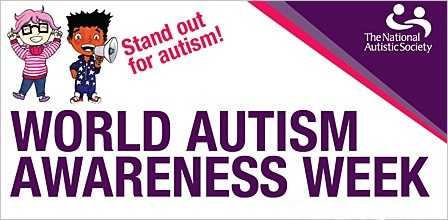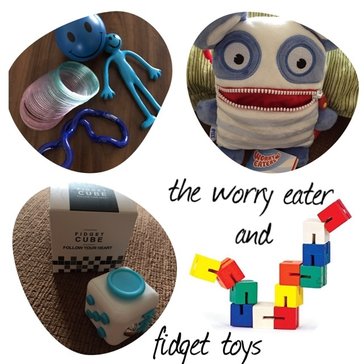|
Monday 27th April marks the start of World Autism Awareness Week. It is a chance to raise some money and help people to become more aware of Autism and how it affects many people's lives.
So what is Autism all about? Ok lets take it back to what Autism is all about, it's a while since I personally have had to define it as I ask this question everyday. With a sixteen year old on the spectrum I am learning all the time about Autism, you can't sit down with one book, read about it and job done, that's it you know all there is to know. It takes a while to initially understand it's meaning, take in all the sciencey bits and as parent that can boggle your mind probably more than sitting through any science lesson you had at school. It is then a case of associating that science and definition of Autism and applying it to someone you know or yourself if requiring your own diagnosis. I am at the stage where Autism fascinates me now but it has become part of my life now for twelve years. It wasn't always like that, some days I've hated it, wanted it to go away and at times I will admit I've not always coped with the understanding of it all. Now days I'm getting to grips with it more, probably as I've realised it affects most of my family including myself. It's here to stay, it is part of the family, so I've learnt to embrace it. That's not to say that sometimes even after twelve years I still want to kick it out the back door on occasions of meltdowns, sensory overload and the days where I can't get my own mind to make sense of the world. It can be very frustrating. Do people stare? If you are living with Autism, especially as a parent, carer, grandparent, sister, brother, cousin or friend do people stare at the person you love with autism? Does their behaviour attract attention? Do you get those looks of disapproval or the look that says 'can't you control that child'? Yep I've had those but do you know what that is? It's just a little bit of misunderstanding.....I know - you want to say 'it's bloomin ignorant but if I go way back to before diagnosis I didn't know anything about autism at all and probably would know very little now if we hadn't gone down this pathway. We tend to draw the blinds on parts of life we just don't understand. That's until someone wakes us up and pulls up the blinds or opens the curtains, whichever furnishings you prefer. Lets tell people and make them understand, lets tell them what it's like to live with Autism and stop people staring. We do live in a staring world. It is a general reaction when you here a noise or see something happening, I've done it myself. For me though, because I am aware of autism I can pop into 'autism mum mode', I can offer a hand or a just a simple phrase to a fellow parent trying to steer their child out meltdown city. It can just be something like 'are you okay and is there anything I can do?' Have you any idea, just how big those words are? That's why I've highlighted them. As someone on the outside you may not be able to do absolutely anything at all but the fact you stopped and offered is, and I can tell you this from experience, it is the best thing someone can do. Suddenly because someone has acknowledged that you are having a tough time, your anxiety levels start to drop and you can feel more in control. Imagine if everyone did that, it would be marvellous! So how can we make people aware? By taking part in Autism Awareness Week next week, either at work by raising money or holding a sponsored event. In school by holding an assembly or changing a lesson to talk about Autism. You even hold a cake sale or pop a collection box in your establishment. It isn't just about the money although this does help to provide support for people and the necessary resources to get the word out - until everyone understands. For more information on how you can take part in Autism Awareness Week go to The National Autistic Society website at www.autism.org.uk where there is a mountain of information and resources you can print off and use to plan an event or take part in some way. If you are unable to hold an event but you want to know more about Autism, just ask someone you know who is living and breathing it. We don't bite and as parents or people on the spectrum we will be more than happy to explain. Also one thing to bear in mind is that, one persons story is just that 'one story'. It is called a spectrum because it is a condition with a wide range of different actions and behaviours, a bit like a rainbow which contains a billion different colours, everyone is different.....unique. I'll leave you with the link to the video available on the NAS website and catch you tomorrow. www.youtube.com/watch?v=FGsUVHBG0SI&feature=youtu.be
0 Comments
I am building up quite a collection of toys and resources to help with the anxiety which accompanies our autism. They are mainly for my son to try different ways to help him cope but also to take them along to our support groups so that people can get an idea of the products available before deciding on the best one to purchase. There are many different items on the market and it can be a case of trying different things until finding one that suits. It maybe the case that you don't need to venture far from some household favourites to help such as blu tack and paperclips, these are great for squeezing like a stress ball or a lot of our young people get a lot of satisfaction from linking lots of paperclips together to make a chain. So why do we need these toys?
Stimming Stimming is also referred to as self-stimulatory behaviour or self stimulation and involves the repetition of physical movements, sounds, or repetitive movement of objects. It is common in individuals with developmental disabilities, but mostly in people with autistic spectrum disorders. Stimming can include hand flapping, rocking, spinning, or repetition of words and phrases. This is a process which someone on the spectrum will use to try and regulate any anxiety or stress from certain situations within their environment. It has a calming effect and shouldn't be discouraged. My son tends to repeat phrases, quotes from films and tv over and over. I can't tell you how many times I have had to update my list of favourite Disney Pixar films, the characters, villains and my favourite tank engine. We all get plenty of reminders for the release of up and coming films and dvd's in fact I'm thinking of doing away with a diary as he is an actual walking talking TV guide and personal organiser. We do have to have the calendar on the wall in the kitchen, it gets checked on a regular basis and you are given your reminder of any such event way before any Google Apple or Microsoft app can remind you. It's very useful but can also be frustrating to hear the same information relayed over and over again, we have got used to it though over the years and if it makes him feel at ease then I will listen as long as I can. It does make me chuckle though as just lately he has started to be aware he is repeating things and actually says 'have I said that before?' 'So sorry mum'. I have told him to text me a reminder which has made things a little easier on the ears, he sends me a text and then it seems to finalise that process of information for him.....for a little while anyway. Tom is also very tactile and has to touch and feel all the time. When he was younger I can't tell you how many times I had to apologise to teaching assistants for his touchy feely moments and the smelling of hair which seems to have stopped now. He could always tell what perfume or shampoo someone used, it was his way of getting to know someone and becoming familiar rather than the use of massive conversation. It's almost as if he built a persons profile by their smell, feel and favourite tank engine. Now he is older though, he has to control some aspects of touching to prevent it being inappropriate and has had to learn to respect peoples personal space. The use of these toys do help, the stress ball and stretchy man are popular as he can apply a lot of pressure to them. He will sometimes take hold of your hand and press hard or he used to push his head and nose against your own so receiving some pressure is obviously a big sensory need for him. Most of these toys and resources are inexpensive so it is possible to experiment and find one that works. The fidget cube is a relatively new product. it is small enough to hold in the hand and has different features on it such as a switch on one side, rolling wheels, buttons and a smooth side. It can be a bit noisey but even I find this a nice distraction. The twist and lock blocks are good, the small wooden blocks can be shifted into a different formation, another easy to hold item. The fiddle kit I purchased came with a stress ball, bendy man and a tangle toy. I remember being given one of these tangle toys when I gave up smoking, it is very good to just twist and turn in different directions and keep those hands busy. Did it stop me smoking? No not really but I have stopped since using other methods. I do like this one though. The slinky was added from a while back and it is also a good one to stretch out and slip through the hands but just be careful, it can get tangled, but I must admit it did provide some amusement getting it back to it's slinky form. The zippy cuddly monster in my photo is a Worry Eater. This, I think is just a brilliant resource. It would suit a younger child maybe but what happens is, if a child is worried or anxious about something, it could be that they have had a bad dream or they may be apprehensive about a visit to the dentist, they write down their worry and pop I into the monsters mouth, zip it up and away that worry goes. You do your magic (a bit like tooth fairy duty) and remove the worry so that when the child checks again, it's all gone! Brilliant idea. I actually use it at the moment to stop me ranting about absolutely nothing on social media, you know when as an adult you don't feel you are having a good people day? A bit of road rage, write it down pop it in the monster........give it to another adult or I pass it to my 14 year old and he's glad to empty it rather than having a moody mother. So you see, these resources can be used by all the family. I purchased my items on Amazon www.amazon.co.uk prices will vary as there are many different products available here but I paid: for The Worry Eater £11.73 Fidget Cube £6.98 Tobar Twist and Lock Blocks £1.62 Fiddle Kit £7.49 Other websites who specialise in toys and resources for people with autism are: www.multi-sensoryworld.co.uk www.sensorytoywarehouse.com www.sensorydirect.com The following information is about Behaviour regarding Autism and is taken from the National Autistic Society website. it is really quite informative. www.autism.org.uk/about/behaviour.aspx I hope that helps a little bit but if you do come to any of the NAS Derby & District support groups I will bring some items along for you to have a look at and try. I will gradually add more to my 'museum' as my youngest son calls it so do come along and take a look, oh and grab a brew and biscuit as well. Our details can be found on Facebook at: www.facebook.com/NASDerbyBranch/ or you can email the branch at derbyanddistrict@nas.org.uk Take care for now and thank you so much for reading. Come back tomorrow for my round up of TV for the week on Pass the Remote Sunday.  I attended two seminars this week, one regarding Anxiety and Behaviour from CAMHS (Child and Adolescent Mental Health Service) and School Exclusions provided by The National Autistic Society. I found then both very informative and realised that over the years I have tended to concentrate a lot on the Autism side of my sons condition rather than seeking more advice regarding his anxiety. The two come very much hand in hand in my opinion and I think we need to pay more attention to children's anxiety issues especially in their learning environment. How is a child expected to learn if they haven't got control of their anxiety and emotional needs? The anxiety also has an impact on the exclusions from school. I know schools have the interests of the other children in the school in mind and keep them safe but schools do have a responsibility to provide good support and make a child feel included before any steps are taken towards exclusion. The NAS have a great Schools Exclusion Service and for more information please go to www.autism.org.uk/services/helplines/school-exclusions.aspx Anxiety can affect any child with any learning disability, even without a disability most us will experience some level of anxiety at some point in our lives. For our kids on the spectrum though it can have a massive impact on their day to day lives. Impacts include:
Everyone has different levels of anxiety and a limit of how much they can take before they feel they can't cope any longer, bringing on the 'meltdown'. If you're autism parent or an educator you'll know the score. The moment where the brain cannot quite process the information and the 'fight or flight' reaction kicks in. Aggressive behaviour, lashing out, punching, kicking tears or quiet, no reaction, reserved, mood swings and feelings of shame? Does this all sound familiar.? Our kids are all different so you may have experienced different actions and it can be very stressful and upsetting for the people around as well. What can we do?
I learnt that the cognitive side of our brain is responsible for helping us deal with anxiety and for the way think, reason and negotiate. I didn't quite realise the extent of how my son's ability to do this is greatly reduced. I felt really good though, being able to talk and understand more. It made a lot of his behaviour a lot clearer and gave me tips on how to cope. The thing is is we tend to try and discipline our kids on the spectrum the same way we would think about disciplining a child who is not on the spectrum. This just doesn't work, I know it goes against everything in the parenting manuals and advice we learn from others but it's time to throw that manual out and make a new set of rules. This is difficult if you have a child who is not on the spectrum asking why they are getting treated differently to their brother or sister on the spectrum. It does seem unfair and hard for them to understand, maybe a group for siblings would be able to help here, or having the talk about autism and how we are all different. It is a tricky one I know from experience. I can't stress enough as a parent how important it is to go to these seminars and support groups. A lot of these sessions are free and you do really learn a lot from professionals and other parents. My son is 16 and I am still learning and picking up great ideas from others. I have tended to just cocoon myself in this world of autism and only just starting recently reaching out for advice myself. I tend to think if I'm running support groups I don't need any support myself but I do just like everyone else. It isn't always easy when it comes to behaviour and anxiety, it can also take time to find a strategy that works. Keep going though and always remember we are all here to help each other so reach out if things get too much. There are some good links to some very useful resources as well which include: Derby CAMHS Service www.derbyshirehealthcareft.nhs.uk/services/childrens-services/camhs/camhs-homepage/ Worry Wise Kids www.worrywisekids.org For a PDF about the 5 Point Scale which is a resource to help children understand their emotions and how to cope. with them. There is also a diagram of the anxiety curve which shows the different stages of anxiety and coping strategies for each stage. www.autismempowerment.org/wp-content/uploads/2013/12/Incredible-5-Point-Scale-Fact-Sheet-rev.pdf I hope this helps a little but if you do still need more help and advice go to the NAS website at www.autism.org.uk Thanks for reading, please feel free to leave any comments about your own experiences, give us a like on Facebook and follow me on Twitter and Instagram. Take care and catch you tomorrow for some TV talk. Thomas and Friends, trains, cars, films, Disney characters, maps, numbers, are all subjects which may attract someone with autism to the point of obsession and all they talk about.
But is this a bad thing? I don't think so, obviously it depends on the subject but I think these interests are there for a reason and may be there to help a person with autism make sense of the world around them. It may be that their interest makes them feel relaxed and happy so why would we think of taking it away or trying to discourage it? The only reason would be that if it was unsafe for the individual or those around them. We had our EHCP (education health care plan) meeting last week for my son and it's always an eye opener as so much can change in a year. So much has really from leaving secondary school and starting sixth form and now he is sixteen it was more centred around him and allowing his input. I'm not sure whether that is because of his age or because that is the routine for the new plans now. I always found the meetings in the past to be a discussion about the young person and then they had very little input at the end but that depends on the level of communication and ability to contribute. Our meeting involved myself, my sons dad, our son and his English teacher. I am no longer with Thoma's dad and haven't been for a long time now but we have maintained a great friendship and do come together for both of our children which is great and something I do feel grateful for. Thomas was asked a lot of questions mainly about himself, how he thought he was coping and what his aspirations were for the future to which one of his answers was.....I'd like to be a zoo keeper!! A bit random! We all looked at each other in suprise, he had never mentioned this before and he doesn't really show a great desire to be with animals.. His teacher looked calm. I had projected myself into the future, thinking about him bringing his work home with him and picturing our garden looking like something from the film Madagascar, which his where he probably got the idea from. His dad however sat there calm as a cucumber and had worked him out straight away to which he asked him if he liked animals - 'Yep' said Thomas, did he like dogs (not a zoo animal I know but we know he isn't keen) - 'ermmm no' said Thomas and did he like animal poo and want to clean up after the animals - 'ermmmm no not at all, they are stinky'. So we established a career as a zoo keeper probably wasn't for him, well not for now. You see Thomas cannot, at the moment anyway, answer questions and give a true answer. He will say anything to get you to be quiet so that this bombardment of questions can finish as soon as possible and he can get back to what the fat controller is up to. This makes him vulnerable with his lack of social skills, that's autism! We also realised that in lessons he was tending to rush work to get to his reward. It was something that had been in place to allow him to get work done, it had been useful but now his teacher knew he was capable of a better standard of work and felt he could be pushed a little more if he could widen his concentration and take his time. It's always been a bit of a challenge but it was worth giving it another try. We asked Thomas if there was a Thomas and Friends story which involved any of the engines which rushed to get a job done but suffered major consequences because of their actions. Suddenly we had got his attention. It was as if he was suddenly accepting us asking the questions because we had entered 'his world'. 'Yes' he said, and we learnt how Dunkin Duncan rushed his work shunting trucks, got into bother and ended up in a situation which didn't end well with the fat controller. I won't spoil it for you if you haven't read the book or seen the episode but we probably have three copies of the book if anyone should want one and it's season six on the dvd's if your interested. So we have now incorporated Dunkin Duncan into college work just as a reminder that we need to try a bit harder and take time to finish work. Whether it works or not I will have to keep you posted but I really do feel that in day to day life we have to enter the world of autism to get a greater understanding and a result. We spend far too much time trying to force people with autism to abide by the rules included in the neuro typical social world, and yes, in some cases it is necessary to pave a way for behaviour to be regarded as acceptable and allow inclusion but it is hard for them. There are times when I don't feel like I need to know anymore about Thomas and his tank engines or Disney Pixar but when I do and I make a conscious effort to get involved I find I can communicate with my son a lot more and it is kind of fun. It's a two way street. I realise it's not going to be the same for everyone and all our experiences with autism are different but this is just my view and our life. I know some aspects of challenging behaviour are not going to be solved by a story or a film and may need further intervention. I will at some point in the future write about challenging behaviour so that we can help those who do have problems but for now thanks for reading about us and I will catch you tomorrow..... .....join me for Pass the Remote Sunday - a review of the last weeks tv. |
Everything AutismEvery Saturday will be about Autism, family and life. Archives
May 2020
Categories
All
|



 RSS Feed
RSS Feed
